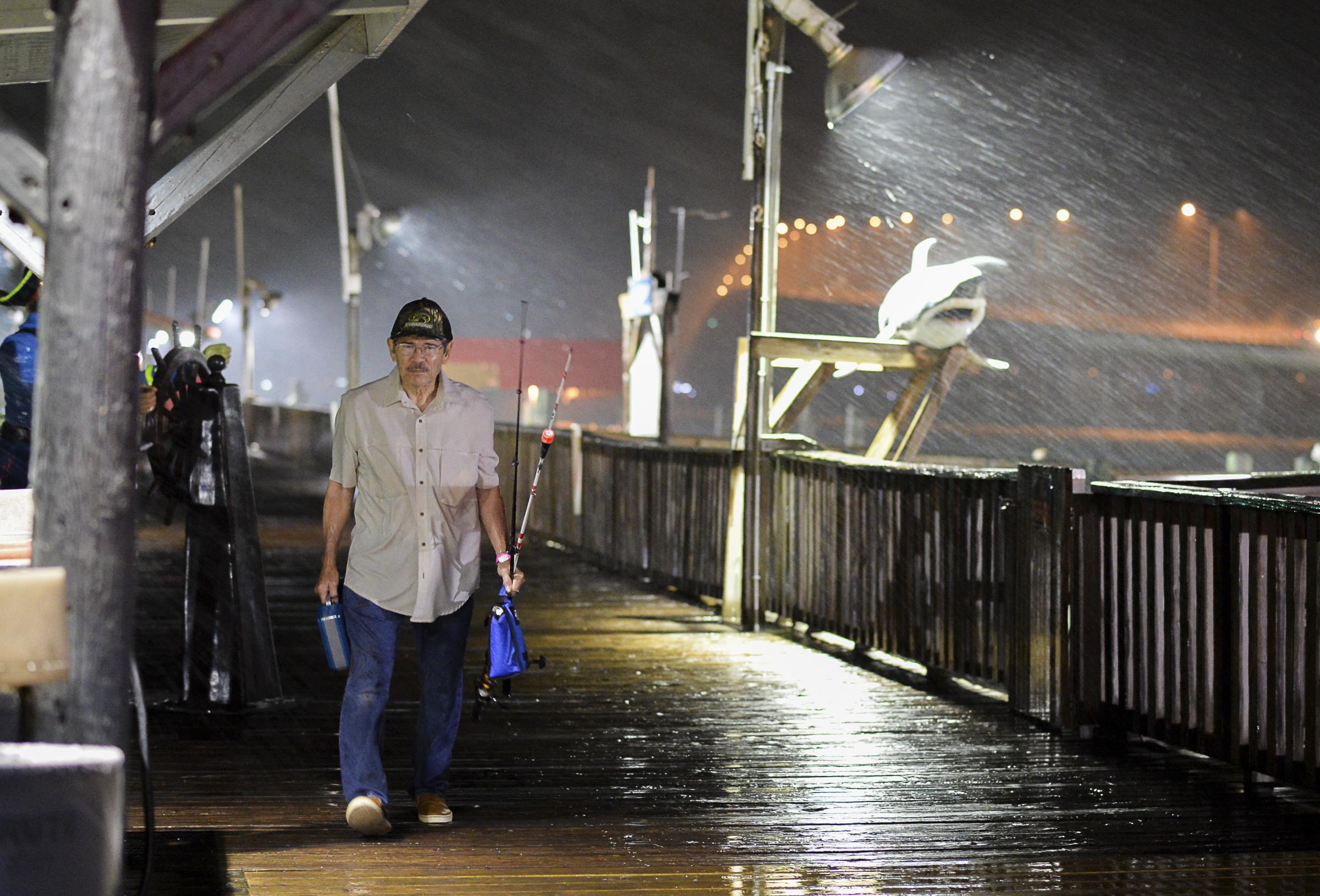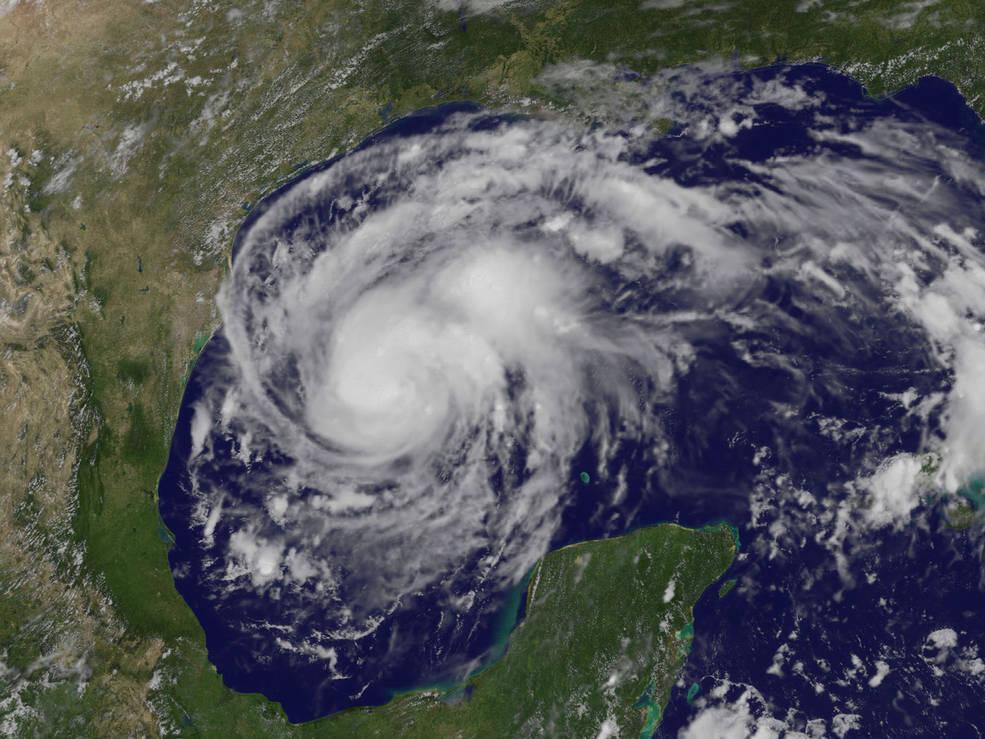Texans steel themselves as Hurricane Harvey bears down on the US: 'We’re preparing for the worst'
'You have to be prepared. You have to be safe rather than sorry.'

Texas residents fleeing what is predicted to be the worst storm to hit the US in a decade have said they are prepared to "go back and not have anything".
Kirsty Gillentine – a resident of the city of Corpus Christi, where Hurricane Harvey is set to wreck the most havoc – is one of the thousands who have evacuated the area. She has packed up her belongings and taken her boyfriend and two dogs to stay with family in College Station, about 250 miles away.
The house she rents in Corpus Christi, she said, was hit by a milder hurricane in the 1970s. The entire second story was ripped off.
“We’re mentally preparing for the worst,” Ms Gillentine told The Independent. “...We’re just trying to prepare ourselves to go back and not have anything.”
Hurricane Harvey – which experts are calling a “life-threatening storm” – is expected to strike Texas’ eastern coastline on Friday night or early Saturday morning. The National Hurricane Centre predicted heavy rainfall, extreme flooding and hurricane-force wind gusts. Areas of the upper Texas coast, the centre said, “may be uninhabitable for weeks or months”.
The rest of Ms Gillentine’s family, however, are “hunkering down” and staying put in nearby Galveston. She said they evacuated for the last serious storm – Hurricane Rita – and didn’t feel like going through the trouble again. Ms Gillentine said she’s concerned about their safety.
“[Hurricanes are] just a part of life down here,” she said. “But they’re nothing to underestimate. You have to be prepared. You have to be safe rather than sorry.”
Experts said the storm could last for five days in some areas, and send up to three feet of rain. Some forecasters are saying that an area around Houston, further inland, could be hit twice, with the hurricane slamming into the coast and then heading back into the Gulf of Mexico before coming back as another storm.
Harvey's heavy rain could turn many towns into “essentially islands” and leave them isolated for days, said Melissa Munguia, deputy emergency management coordinator for Nueces County.

Texas Governor Greg Abbott declared a pre-emptive state of disaster on Wednesday for 30 counties, and mobilised 700 members of the National Guard ahead of the storm’s arrival. On Friday morning, he urged residents still located in the storm’s path to evacuate immediately.
Mr Abbott also spoke with President Donald Trump, who pledged all available federal resources to assist in preparation, rescue, and recovery efforts. At a White House press conference on Friday, homeland security adviser Tom Bossert said Mr Abbott had requested a federal declaration of emergency, which Mr Trump was considering. He added that the President was receiving frequent briefings from himself and White House Chief of Staff John Kelly.
“We’re in good hands at the federal level," he said. “...Now is not the time to lose faith in your government institutions.”
Press Secretary Sarah Huckabee Sanders added that the President was considering visiting Texas early next week.
The storm was expected to send up to 15 inches of rainfall to Houston, and strike Austin – located toward the centre of the state – with heavy winds. Eastern coastline cities like Corpus Christi, Port Mansfield, and Port O'Connor, however, were expected to weather the worst of it.
Corpus Christi Mayor Joe McComb strongly encouraged residents to evacuate before the storm hit.
"If it's 10 feet of water, there's a good chance you will lose electricity," Mr McComb said. "So you'll be on the Island with no [air-conditioning], no water, no electricity. We recommend in the strongest terms that you need to get out now or get to higher ground."
The National Hurricane Centre predicted roads would be left impassable, and structures would be washed away. But until the storm passed, many officials said, it was just a matter of waiting.
“Basically our work for these type of events doesn’t start until after the weather has passed,” Mark Cross, a spokesman for Texas Department of Transportation, told The Independent. “We’re basically staging our people just outside the impacted area so that they can move in once the weather has passed, and we can clean up and make sure traffic is not too stalled.”
In Harris County, local authorities were preparing for floods by deploying air boats and other rescue equipment. But until the storm hit, Harris County Sheriff's Department senior deputy Thomas Gilliland said, “we really don’t know what’s going to happen yet, so we’re just in wait mode”.
Ms Gillentine said she felt much the same way.
“We’re actually kind of sitting around now, waiting to see what happens,” she said on Friday. “That's really all we can do.”
Join our commenting forum
Join thought-provoking conversations, follow other Independent readers and see their replies
Comments
Bookmark popover
Removed from bookmarks